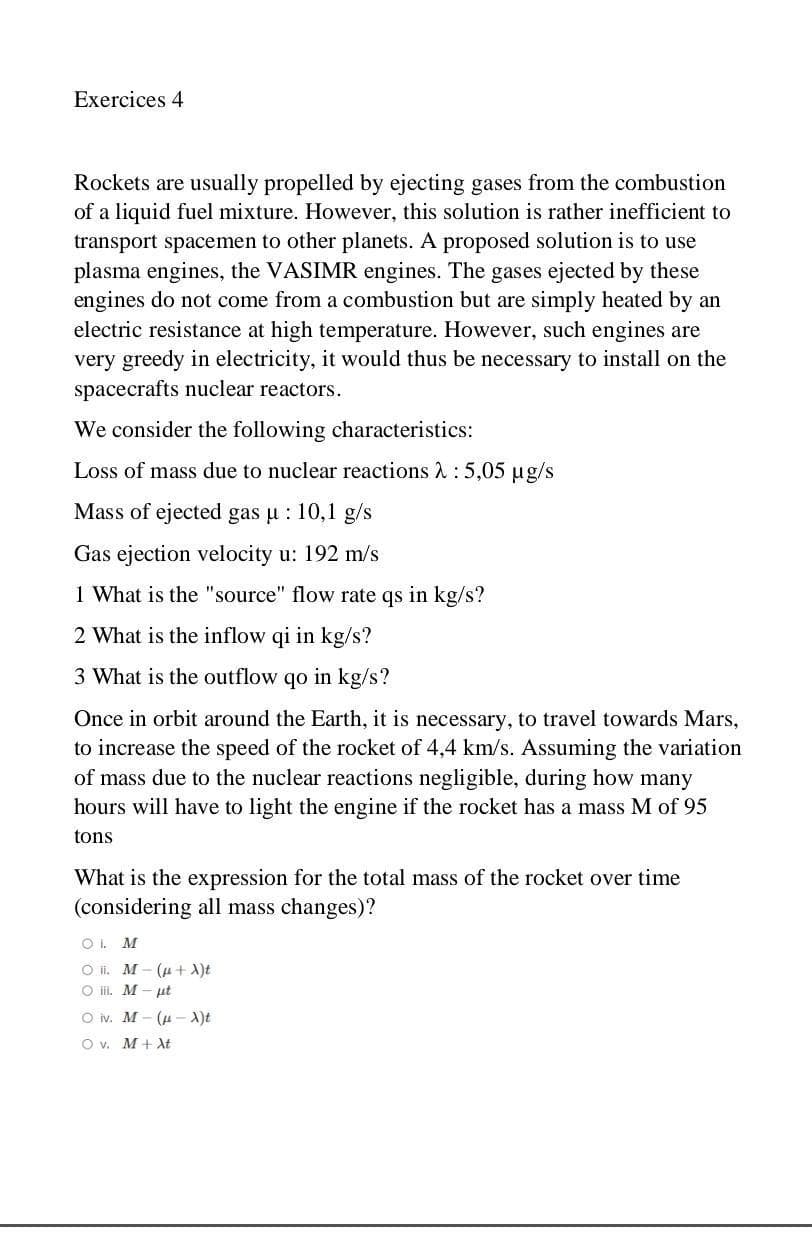Rockets are usually propelled by ejecting gases from the combustion of a liquid fuel mixture. However, this solution is rather inefficient to transport spacemen to other planets. A proposed solution is to use plasma engines, the VASIMR engines. The gases ejected by these engines do not come from a combustion but are simply heated by an electric resistance at high temperature. However, such engines are very greedy in electricity, it would thus be necessary to install on the spacecrafts nuclear reactors. We consider the following characteristics: Loss of mass due to nuclear reactions : 5,05 ug/s Mass of ejected gas u : 10,1 g/s Gas ejection velocity u: 192 m/s 1 What is the "source" flow rate qs in kg/s? 2 What is the inflow qi in kg/s? 3 What is the outflow qo in kg/s?
Rockets are usually propelled by ejecting gases from the combustion of a liquid fuel mixture. However, this solution is rather inefficient to transport spacemen to other planets. A proposed solution is to use plasma engines, the VASIMR engines. The gases ejected by these engines do not come from a combustion but are simply heated by an electric resistance at high temperature. However, such engines are very greedy in electricity, it would thus be necessary to install on the spacecrafts nuclear reactors. We consider the following characteristics: Loss of mass due to nuclear reactions : 5,05 ug/s Mass of ejected gas u : 10,1 g/s Gas ejection velocity u: 192 m/s 1 What is the "source" flow rate qs in kg/s? 2 What is the inflow qi in kg/s? 3 What is the outflow qo in kg/s?
Principles of Heat Transfer (Activate Learning with these NEW titles from Engineering!)
8th Edition
ISBN:9781305387102
Author:Kreith, Frank; Manglik, Raj M.
Publisher:Kreith, Frank; Manglik, Raj M.
Chapter5: Analysis Of Convection Heat Transfer
Section: Chapter Questions
Problem 5.32P
Related questions
Question

Transcribed Image Text:Exercices 4
Rockets are usually propelled by ejecting gases from the combustion
of a liquid fuel mixture. However, this solution is rather inefficient to
transport spacemen to other planets. A proposed solution is to use
plasma engines, the VASIMR engines. The gases ejected by these
engines do not come from a combustion but are simply heated by an
electric resistance at high temperature. However, such engines are
very greedy in electricity, it would thus be necessary to install on the
spacecrafts nuclear reactors.
We consider the following characteristics:
Loss of mass due to nuclear reactions A : 5,05 ug/s
Mass of ejected gas u: 10,1 g/s
Gas ejection velocity u: 192 m/s
1 What is the "source" flow rate qs in kg/s?
2 What is the inflow qi in kg/s?
3 What is the outflow qo
in kg/s?
Once in orbit around the Earth, it is necessary, to travel towards Mars,
to increase the speed of the rocket of 4,4 km/s. Assuming the variation
of mass due to the nuclear reactions negligible, during how many
hours will have to light the engine if the rocket has a mass M of 95
tons
What is the expression for the total mass of the rocket over time
(considering all mass changes)?
O. M
O ii. M - (u+ A)t
O lii. M - ut
O v. M - (u - A)t
O v. M+ t
Expert Solution
This question has been solved!
Explore an expertly crafted, step-by-step solution for a thorough understanding of key concepts.
Step by step
Solved in 2 steps

Knowledge Booster
Learn more about
Need a deep-dive on the concept behind this application? Look no further. Learn more about this topic, mechanical-engineering and related others by exploring similar questions and additional content below.Recommended textbooks for you

Principles of Heat Transfer (Activate Learning wi…
Mechanical Engineering
ISBN:
9781305387102
Author:
Kreith, Frank; Manglik, Raj M.
Publisher:
Cengage Learning

Principles of Heat Transfer (Activate Learning wi…
Mechanical Engineering
ISBN:
9781305387102
Author:
Kreith, Frank; Manglik, Raj M.
Publisher:
Cengage Learning